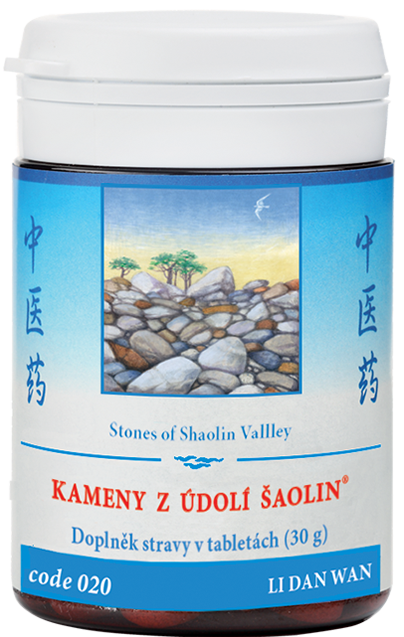
- Qing pi (Green Tangerine Peel)
- Yin chen hao (Virgate Wormwood)
- Zhi mu (Anemarrhena Rhizome)
- Ban lan gen (Woad Root)
- Huang qin (Baical Skullcap Root)
- Huo xiang (Wrinkled Giant Hyssop)
- Chai hu (Bupleurum Root)
- Jin qian cao (Asian Moneywort Herb)
- Bai shao (White Peony Root)
- Yu jin (Curcuma Tuber)
- Zhi zi (Cape Jasmine Fruit)
- Microcrystalline cellulose (MCC) 1%
Affects based on the TCM:
- Clears bile ducts
- Eliminates inflammation
- Cools heat and dispels dampness from the gallbladder DAN SHI/RE
Usage:
- Acute or chronic inflammation of the gallbladder or bile ducts
- Dissolves gallstones
- May eventually excrete gallstones up to 1 cm
Description according to traditional Chinese medicine: This is a modification of the original traditional Chinese herbal mixture LI DAN WAN, adjusted to meet today’s needs. Gall bladder inflammations and the resulting bladder stones are so common today that we take them as something natural. According to Chinese medicine, they are the result of accumulation of moisture and heat on the gall bladder pathway which impairs the kidneys and the urinary bladder. The gall bladder is often affected by stress (frequent irritation or suppressed emotions) as well as by “heavy”, hard-to-digest food typical for Czech cuisine, which brings moisture and heat to the gall bladder. Bile becomes thick, later on the heat stifles the moisture and creates sand and almost mud, which in the end turns into rocks. We find them not only in the gall bladder but also in the urinary bladder and in the kidneys because the mechanism of formation is similar. This mixture eliminates moisture and heat from the gall bladder area, which means that it calms down the inflammation and dissolves the “mud” in the bladder as well as in the urinary tract as well as stones 1–2 cm in size. It is necessary to follow the required diet.
Packaging: 100 tablets / 30 g (100% natural, natural cellulose max. 1% is the only binding agent; made from concentrated herbs at a ratio of 5:1, i.e. 5 g of dried herbs are used per gram of herbal tablets)
More information about dosage and using herbal tablets.
Click here to search where to buy LONG DAN XIE GAN WAN JIA JIAN on Google

- Qing pi (Green Tangerine Peel)
- Yin chen hao (Virgate Wormwood)
- Zhi mu (Anemarrhena Rhizome)
- Ban lan gen (Woad Root)
- Huang qin (Baical Skullcap Root)
- Huo xiang (Wrinkled Giant Hyssop)
- Chai hu (Bupleurum Root)
- Jin qian cao (Asian Moneywort Herb)
- Bai shao (White Peony Root)
- Yu jin (Curcuma Tuber)
- Zhi zi (Cape Jasmine Fruit)
- Microcrystalline cellulose (MCC) 1%
Each batch of our herbal products is tested in the accredited Phytax laboratory for medicines in Schlieren (Switzerland). This testing identifies herbs, but also heavy metals (mercury, cadmium, lead, arsenic, and copper), bacteria (E. coli, salmonella, total number of bacteria), mould, yeasts and aflatoxins. TCM Herbs is the only supplier in Europe that tests each batch of herbs for all its herbal tablets. Among other things, the herbal products are tested for 511 types of pesticides (4 groups). This is because pesticides have become a worldwide problem, especially in products from the so-called third world. Customers buy herbal products in the belief that they are completely natural, but often these products are “contaminated” with other undesirable “chemicals”.
The herbal tablets and beverages from our company (TCM Herbs) are the only ones in Europe to have been additionally tested. Among others, our products are tested for 511 pesticides — and this number is continuously increasing due to the use of new pesticides. Pesticides are now becoming a global problem! Such a range of checks on pesticides cannot even be detected in laboratories in Europe. Neither is anyone testing it, because unfortunately European legislation does not require these examinations. This comprehensive testing of each batch, and each herb beyond the normal examinations does require considerable financial costs, but the quality of herbs and safety of our products is our absolute priority.
Laboratories are different
A certified laboratory for food supplements is obliged to examine the presence of heavy metals, fungi, and bacteria. However it only determines a smaller range of pesticides and its requirements for their quality content in herbs are lower.
On the other hand, a certified laboratory for medicines also identifies individual herbs and, in particular, tests the entire range of pesticides (at least 500 types) and has higher requirements for the quality in herbs. In the EU, there are only a few laboratories like that and the prices for their services are rightly high. Today, it is therefore very important to know which laboratory tests the dietary supplement and what the tests are focused on; if each batch and each herb are tested, or just a random sample, for how many pesticides, how many added ingredients and how many additional binding agents the product contains, etc. – otherwise consumers could be easily deceived and disappointed (you can find more details at Safety and Quality of TCM Herbs Products).
All our herbal products are tested in a certified laboratory for medicines.
The above information implies that herbal tablets and drinks of TCM Herbs are, in terms of quantity (concentration of herbs in the mixture is 5 times higher, i.e. 1 g of a herbal tablet equals 5 g of raw herbs) and quality (unprecedented testing of each batch), among the best products we can imagine and enjoy in terms of today’s natural medicines.

